Legislative Round-Up: Short Session Begins Monday
As the General Assembly prepares to reconvene in Raleigh on Monday, April 25 for its short session, several important events have taken place. The North Carolina Medical Society (NCMS) has been monitoring them carefully. Below is a brief summary in anticipation of the session.
DHHS Listening Sessions on Medicaid Reform Waiver:
The NC Department of Health and Human Services (DHHS) wrapped up its statewide ‘listening tour’ to gather feedback on its Medicaid reform draft waiver application on Monday in Pembroke. The 12 public hearings began March 30 in Raleigh, with that gathering drawing over 200 attendees. The smallest hearing occurred in far western Sylva with 23 participants. NCMS staff attended most of the gatherings and are pleased to report that many physicians testified about the state’s plan. Recurring themes in physician comments included calls to:
- Safeguard patient access to care and make sure beneficiaries have a voice in the process.
- Standardize processes to eliminate the administrative burden from dealing with possibly five different plans/payers.
- Support Medicaid expansion.
- Ensure continuation of community supports and analytics.
- Maintain adequate levels of funding for care and necessary services.
Written comments also were accepted through Monday, April 18. NCMS submitted formal comments to DHHS. Read our comments here. DHHS plans to submit the waiver application to the Centers for Medicare and Medicaid Service (CMS) by June 1. There also will be an opportunity for interested parties to comment on the plan directly to CMS.
Joint Legislative Committee Makes Recommendation on APRN Supervision Changes:
The Joint Legislative Oversight Committee for Health and Human Services decided at its meeting last Tuesday, April 12, to recommend to the General Assembly to continue to study whether to change supervision requirements for advanced practice nurses. Some on the committee had pushed to introduce legislation during the short session to eliminate supervision for advanced practice registered nurses, certified nurse midwives and nurse anesthetists. NCMS President Docia Hickey, MD, and NCMS Director of Legislative Relations Chip Baggett testified at a committee meeting earlier this year on the issue. Ultimately the committee decided this week to study the issue and re-consider legislation in 2017.
Looking ahead, it will be important to consider how scope of practice issues may play into the move to value-based systems of care.
Medicare Audit Results – No Need for Concern:
Recent state and federal audits of the North Carolina Medicaid program may have gotten your attention because of the big numbers. The state audit showed North Carolina improperly paid $835 million to Medicaid providers last year. The federal audit, by the Office of Inspector General for the US Department of Health and Human Services, showed the state owes the federal government $1.5 million as a result of using the wrong formula to adjust claims between July 2008 and June 2013. The NC Department of Health and Human Services (DHHS) is contesting those findings, saying the $835 million figure cited in the state audit is inflated and that the correct formula was used to adjust for payment errors or retroactive rate changes as examined by the federal audit. Regardless, physicians should not worry about an impending recoupment.
The federal audit looked at 17 states, and North Carolina looked good in comparison to the error rate in other states. Our error rate of 6.7 percent was below the average rate of 8 percent, and well below the state with the highest rate of payment errors at 18.6 percent.
“We’re in good shape,” Baggett said. “The audit shows improvement for our system. It shows you’re getting paid properly. You don’t have to worry that this is another opportunity for a large recoupment.”
To hear directly from Baggett on these and other legislative issues in anticipation of the upcoming session, watch his Bowtie Briefing from Friday, April 15 here.
Medical Board Launches New Program To Monitor Opioid Prescribing
From the North Carolina Medical Board
The North Carolina Medical Board is launching a new effort to address potentially unsafe opioid prescribing in an attempt to reduce patient harm from misuse and abuse of these medications. The Board emailed licensed physicians and physician assistants (PAs) about the new program this week.
Using data provided in accordance with state law by the NC Department of Health and Human Services (NCDHHS), the Board will investigate prescribers who meet one or more of the following criteria:
- The prescriber falls within the top 1 percent of those prescribing 100 milligrams of morphine equivalents (MME) per patient per day.
- The prescriber falls within the top 1 percent of those prescribing 100 MMEs per patient per day in combination with any benzodiazepine and is within the top 1 percent of all controlled substance prescribers by volume.
- The prescriber has had two or more patient deaths in the preceding 12 months due to opioid poisoning.
The Medical Board will determine the appropriateness of prescribing through standard methods, including review of patient records, independent expert medical reviews and written responses from the prescriber. In its email to physicians and PAs, the Board acknowledged prescribers identified through the stated criteria may be practicing and prescribing in accordance with accepted standards of care. Given the known risks of opioids and the rising incidence of unintentional overdose deaths, the Board wrote that it has an obligation to verify that care and prescribing is clinically appropriate.
Physicians and others who treat chronic pain are encouraged to review current standards of care by reading NCMB’s position statement on use of opiates for the treatment of pain. According to the Board, cases that result in public action against the prescriber universally involve one or more significant departures from accepted standards of care.
Do Your Part On National Prescription Drug Take-Back Day
 Mark your calendar and be sure to tell your patients that Saturday, April 30 is National Prescription Drug Take-Back Day. The purpose of this day is to provide a safe, convenient and responsible way to dispose of prescription drugs and educate the general public about the potential for abuse of medications – a much publicized and serious problem in many communities throughout North Carolina and the country. Learn how to properly dispose of these medications and find a collection site near you by clicking here.
Mark your calendar and be sure to tell your patients that Saturday, April 30 is National Prescription Drug Take-Back Day. The purpose of this day is to provide a safe, convenient and responsible way to dispose of prescription drugs and educate the general public about the potential for abuse of medications – a much publicized and serious problem in many communities throughout North Carolina and the country. Learn how to properly dispose of these medications and find a collection site near you by clicking here.
Opportunity for Rural Practices to Prepare for the Future
On Wednesday, May 11, small, rural, ‘safety net’ practices have the opportunity to attend a practical workshop on how to effectively promote health and wellness among your patients, improve the health of your community and increase practice revenue and improve your quality scores. The free workshop will be held at the NCMS Center for Leadership in Medicine, 222 N. Person St., Raleigh, from 10 a.m. to 4 p.m. To participate you must register by contacting Dana Lucas at [email protected] or calling (919) 833-3836.
The workshop, sponsored by the North Carolina Medical Society Foundation, in cooperation with the North Carolina Medical Group Management Association, National Rural Accountable Care Consortium and CHESS, is part of the Transforming Clinical Practice Initiative (TCPI). This federal program provided $31 million to establish Practice Transformation Networks (PTN) to assist more than 7,000 small, safety net practices transition from fee-for-service payment models to value-based, alternative payment models, like Accountable Care Organizations.
The National Rural Accountable Care Consortium is the PTN the North Carolina Medical Society (NCMS) is working with to provide training to practice managers and care coordinators to facilitate value-based care and provide the population health management infrastructure to support better care, lower costs and increase physician and patient satisfaction. Here is more information about what resources are offered by the National Rural Accountable Care Consortium as well as how to become part of the TCPI.
Have An Opinion About Health Care Today? Express It Here
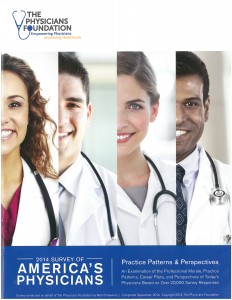 By taking just a few minutes now to complete this survey, you will have made your opinion count. Sponsored by The Physicians Foundation, a non-profit organization seeking to empower physicians to lead in the delivery of high-quality, cost-efficient health care, this is one of the largest physician surveys ever undertaken in the United States.
By taking just a few minutes now to complete this survey, you will have made your opinion count. Sponsored by The Physicians Foundation, a non-profit organization seeking to empower physicians to lead in the delivery of high-quality, cost-efficient health care, this is one of the largest physician surveys ever undertaken in the United States.
The results will help lawmakers, influential health care policymakers and the media better understand your perspective and the challenges you face. The data also is broken down by state, so the more North Carolina physicians who complete the survey, the fuller picture everyone will have about key issues you face. All those who complete the survey will receive a copy of the final report.
If voicing your opinion is not enough of an incentive, taking the survey makes you eligible to win one of five $500 Amazon gift cards and one $5,000 Amazon gift card.
Please take a few minutes to complete this survey and add your voice to the thousands of other physicians nationally.
Take the survey.
Friday, May 13th Is Your Lucky Day
 Friday, May 13th can be your lucky day to join the North Carolina Medical Society (NCMS) Board of Directors and the Durham-Orange County Medical Society at the Umstead Spring Leadership Mixer at the Umstead Spa & Hotel, Cary. Come to the Ballroom Terrace from 5:30-7:30pm to mix and mingle with the leadership of both of these organizations.
Friday, May 13th can be your lucky day to join the North Carolina Medical Society (NCMS) Board of Directors and the Durham-Orange County Medical Society at the Umstead Spring Leadership Mixer at the Umstead Spa & Hotel, Cary. Come to the Ballroom Terrace from 5:30-7:30pm to mix and mingle with the leadership of both of these organizations.
This is another opportunity to meet and discuss issues of concern to you with NCMS board members as part of the new governance structure, which makes the Board of Directors the NCMS’ policymaking body. The Board has been holding its meetings throughout the state – their next meeting in July will be in Charlotte -- and will offer a similar chance for physicians in that area to meet with the directors informally. Keep your eye on the Bulletin and NCMS website for details.
NCMS members always are welcome to submit ideas to the Board for new or updated policies through the online submission form available here.
Be sure to RSVP today to come ‘hang’ with us on May 13.
Wellness Wins – Learn How to Get and Stay Healthy at the M3 Conference
Join fellow physicians and medical group managers at the Merging Medicine and Management (M3) conference for educational content that addresses both pr ofessional goals and personal well-being. Renowned authority on fitness, weight management and healthy living Sean Foy will make his dynamic presentation entitled “What is Your WHY?” Foy addresses the importance of work/life balance and helps participants to reconnect with the joy and purpose in their lives.
ofessional goals and personal well-being. Renowned authority on fitness, weight management and healthy living Sean Foy will make his dynamic presentation entitled “What is Your WHY?” Foy addresses the importance of work/life balance and helps participants to reconnect with the joy and purpose in their lives.
An author, exercise physiologist, behavioral coach and speaker, Foy is known as “America’s Fast Fitness Expert” and offers an upbeat, positive and sensible approach to making fitness happen, even with the busiest of schedules. He has taken his message of “simple moves” fitness all over the world.
The author of the Wellness Councils of America’s physical activity and exercise books, “Fitness That Works” and “Walking 4 Wellness,” Foy also is the author and creator of “The Burst Workout” and the coauthor of the New York Times bestseller, “The Daniel Plan”.
Among numerous awards, Foy has received the “Nike Go” Top National Health Education Program Award and the California Governor Health Educator of the Year Award and is the co-creator of an award winning children’s health and fitness program, “LEAN KIDS”. He also is the developer of the signature fitness program for The Biggest Loser® Pro Training program.
A husband and father of two, Foy also is President and founder of Personal Wellness Corporation, an international health and wellness education and consulting firm. He has spent the last 25 years testing, researching and sharing his findings on how to crack the code to making fitness work and maximizing potential.
Be sure to attend the M3 conference to be inspired by Foy and the others in the dynamic line-up of speakers planned. Registration will open next month, so watch for announcements in the Bulletin and via email.
Museum To Dedicate Medicinal Garden Kiosk April 30 Thanks to Dr. Graham
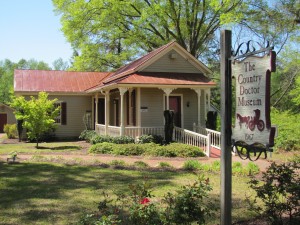 Thanks to the generosity of longtime North Carolina Medical Society (NCMS) member Gloria Graham, MD, 2015 NC Doctor of the Year, the Country Doctor Museum in Bailey has a new information kiosk in its popular medicinal garden. Dr. Graham donated part of her $5,000 NC Doctor of the Year award to the museum, which she helped found.
Thanks to the generosity of longtime North Carolina Medical Society (NCMS) member Gloria Graham, MD, 2015 NC Doctor of the Year, the Country Doctor Museum in Bailey has a new information kiosk in its popular medicinal garden. Dr. Graham donated part of her $5,000 NC Doctor of the Year award to the museum, which she helped found.
“It’s something we’ve been wanting for some time,” said Anne Anderson, the museum’s curator. The kiosk will “help people enjoy the garden when we’re not here to explain it to them.”
The garden, which was dedicated in 1971 and features an assortment of carefully labeled medicinal plants, is open even when the museum buildings on the site are closed. Garden clubs and others who enjoy the serene surroundings frequent the garden, and the kiosk will offer information on the plants and seasonal features of note.
On Saturday, April 30, at 1 p.m., Dr. Graham officially will unveil this latest addition as part of the museum’s Springfest and Plant Sale. Everyone is invited to the daylong festivities, which include free tours of the museum and garden, herbal tea tastings as well as homemade baskets and a wide variety of plants and natural products available for purchase. For more information on Springfest, visit the Country Doctor Museum website or call 252-235-4165.
 Dr. Graham along with her good friend and colleague Josephine Newell, MD, the NCMS’ first woman president, were instrumental in founding the Country Doctor Museum in 1967 as a lasting tribute to their physician ancestors. Dr. Newell was the seventh in a direct line of country doctors, and lived in the house next door to the current museum buildings for many years. Dr. Graham’s father, James Meigs Flippin, MD, was a country doctor in Pilot Mountain, NC, practicing for 77 years. Several artifacts from his office are displayed in the museum including his double roll top desk.
Dr. Graham along with her good friend and colleague Josephine Newell, MD, the NCMS’ first woman president, were instrumental in founding the Country Doctor Museum in 1967 as a lasting tribute to their physician ancestors. Dr. Newell was the seventh in a direct line of country doctors, and lived in the house next door to the current museum buildings for many years. Dr. Graham’s father, James Meigs Flippin, MD, was a country doctor in Pilot Mountain, NC, practicing for 77 years. Several artifacts from his office are displayed in the museum including his double roll top desk.
Dr. Graham remembers her father’s practice well since it was in their home, as was often the case for rural physicians in the late 19th and early- to mid-20th centuries, the period covered by the museum.
"We'd have people knocking at the door and coming into the office at all times — day and night. And I went on baby cases, sometimes two or three nights a week," Dr. Graham recalled in a 2011 article in Dermatology Times. "He delivered all the babies in that area until he was about 92 years old. He delivered the last one at 94. Nobody else could come, and he went in and delivered it on the living room couch."
The Country Doctor Museum explores what life was like for both the doctor and the patient. The Carriage House focuses on how doctors got to their patients – horse and buggy or, later, Ford Model T’s – with the actual vehicles used by country doctors on display. Among the more than 5,000 medical artifacts featured in the museum building, which is made up of two historic country doctor offices relocated to the site, are the tools, formularies, patient ledgers, apothecary items for mixing and rolling pills, amputation kits dating back to the Civil War as well as blood-letting instruments and live medicinal leeches to help illustrate advances in medical science.
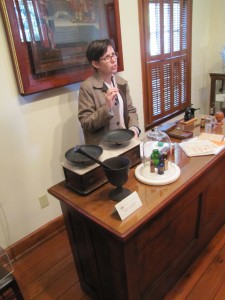
“Country doctors were really connected and involved in the life of the community. They had leadership roles,” Anderson said. They would care for everyone in a community without regard to whether the patient could pay. The patient ledger on display notes patients who paid for their care with corn, ham, peaches or work. “It was often a barter system,” Anderson said. “There was always that balance between wanting to help and collecting enough money. They didn’t become wealthy, but they had a comfortable life. The community looked out for them.”
As an integral part of the community, the physician often didn’t even need to take a health history since they knew the families so well.
While there are many differences between rural physicians of yesterday and those of today, Anderson pointed out there seems to be a harkening back to some of the old ways. For instance, taking narrative medical histories has returned in certain practices, employing a scribe so physicians have more face time with their patients while still fulfilling electronic medical record requirements, even models of care that center on making house calls.
The quality that transcends time and place, Anderson believes, is what she calls the “spirit of the country doctor.” That spirit means, first and foremost, compassion and caring for the patient, a quality that lives on in the practice of medicine today.
The Country Doctor Museum is governed by the Eastern Carolina University Medical Foundation and managed as part of its Health Science Library. Monetary donations may be made directly to the Country Doctor Museum. To donate an artifact consult the guide to donating artifacts here.
Leadership College Alumnus, Dr. Cummings, Installed as UNC-Pembroke Chancellor
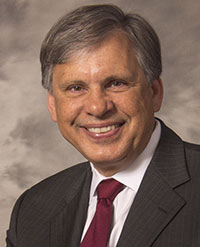 Robin Gary Cummings, MD, a 2005 alumnus of the North Carolina Medical Society (NCMS) Foundation’s Leadership College, was installed as the sixth Chancellor of the University of North Carolina-Pembroke on Friday, April 8.
Robin Gary Cummings, MD, a 2005 alumnus of the North Carolina Medical Society (NCMS) Foundation’s Leadership College, was installed as the sixth Chancellor of the University of North Carolina-Pembroke on Friday, April 8.
“It was a most meaningful presentation,” said NCMS CEO Robert W. Seligson, who attended the ceremony representing the NCMS along with NCMS Board member Michelle Jones, MD and her husband. “Dr. Cummings was born to take this job.”
Dr. Cummings is a native of Pembroke and a member of the Lumbee Tribe. The installation ceremony was dedicated to the memory of his parents, The Reverend Simeon F. and Mrs. Maude Cummings who “were ardent believers in the power of faith and education to change lives,” according to the program for the event.
Dr. Cummings, an NCMS member since 1998, is a board-certified general and cardiothoracic surgeon. He earned his undergraduate degree from the University of North Carolina-Chapel Hill, and his medical degree from Duke University Medical School where he interned in surgery and completed residencies in surgery and cardiac surgery. For 12 years, until 2004, Dr. Cummings practiced cardiothoracic surgery at the Pinehurst Surgical Clinic and Moore Regional Hospital.
In 2009, Dr. Cummings became medical director and executive director of Community Care of the Sandhills. In early 2013, he joined the NC Department of Health and Human Services (DHHS) as Director of the NC Office of Rural Health and Community Care. Six months later, he was named Deputy Secretary for Health Services and Acting State Health Director, later taking on additional responsibility for the Division of Medical Assistance.
Last May, when the UNC Board of Governors elected Cummings as chancellor, then UNC President Tom Ross said of Dr. Cummings: “In a succession of challenging jobs in medicine and state government and through his volunteer service to the University and state, Robin Cummings has exhibited great imagination, energy and leadership. As a Pembroke native, member of the Lumbee tribe, and former chair of the UNC Pembroke Board of Trustees, he understands and appreciates the university’s rich history, and he is passionate about the larger role UNCP can play in the life of the region and its potential to change the future of so many North Carolinians.”
Congratulations Dr. Cummings!
Dr. Joanne Allen Elected Trustee for American College of Sports Medicine
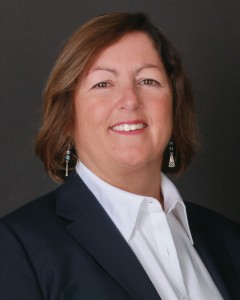 North Carolina Medical Society (NCMS) member and President of the New Hanover Pender County Medical Society Joanne (Anne) B. Allen, M.D., a board-certified physical medicine and rehabilitation specialist at OrthoWilmington, has been elected as trustee for medicine on the American College of Sports Medicine (ACSM) Board of Trustees.
North Carolina Medical Society (NCMS) member and President of the New Hanover Pender County Medical Society Joanne (Anne) B. Allen, M.D., a board-certified physical medicine and rehabilitation specialist at OrthoWilmington, has been elected as trustee for medicine on the American College of Sports Medicine (ACSM) Board of Trustees.
“Being on the board is a huge honor because ACSM is the largest sports medicine organization of professionals in the world,” said Dr. Allen. “As a physical medicine and rehabilitation physician, ACSM was instrumental in shaping my career.”
ACSM has more than 50,000 members and certified professionals worldwide, and it’s dedicated to advancing and integrating scientific research to provide educational and practical applications of exercise science and sports medicine.
Congratulations Dr. Allen!
CMS Launches New Initiative For Primary Care
The Centers for Medicare and Medicaid Services (CMS) recently announced the launch of a new program they are calling the Comprehensive Primary Care Plus (CPC+) initiative. The five year project will bring together Medicare and other payers (commercial, Medicaid) in up to 20 regions throughout the country and will partner with up to 2,500 practices and an estimated 20,000 clinicians to help transform and improve how primary care is delivered and paid for.
CMS will first be soliciting payer proposals to participate in the initiative through June 1, 2016. Based on the geographic region of each of the payers involved, CMS will then publicize the regions and solicit applications (July- September 1, 2016) from practices and clinicians. According to CMS, the initiative is designed to provide doctors the freedom to care for their patients the way they think will deliver the best outcomes and to pay them for achieving results and improving care.
For more information on this initiative, CMS has provided this Fact Sheet.
Mapping Tool Reveals Disparities in Health Care
A new interactive tool from the Centers for Medicare and Medicaid Services (CMS) allows users to better understand geographic disparities in chronic disease among Medicare beneficiaries. The Mapping Medicare Disparities (MMD) Tool is expected to help government agencies, policymakers, researchers, community-based organizations, health providers, quality improvement organizations and the general public analyze chronic disease disparities, identifying how a region or population may differ from the state or national average.
Identifying where to target resources to promote health equity is central to CMS’ Office of Minority Health’s September 2015 plan “CMS Equity Plan for Improving Quality in Medicare” In 2014, two-thirds of Medicare beneficiaries had multiple chronic conditions and accounted for 94 percent of Medicare spending. Also, data show racial and ethnic minorities experience disproportionately higher rates of disease, inferior quality of care and reduced access to care as compared to their white counterparts Understanding disparities and their geographic variations is important to inform policy decisions and to identify populations and localities to target for interventions.
The new MMD tool presents health-related measures from Medicare claims by sex, age, dual eligibility for Medicare and Medicaid, race and ethnicity, and state and county. It provides users with a quick and easy way to identify areas with large numbers of vulnerable populations to target interventions that address racial and ethnic disparities.
Survey Shows Physicians Drive Significant Revenue for Hospitals
A recently released national survey by Merritt Hawkins, a national physician search firm, suggests that physicians are key drivers of hospital revenue. A single physician generates an average $1,560,688 a year in net revenue on behalf of his or her affiliated hospital, the survey shows.
The survey asked hospital chief financial officers to quantify how much revenue physicians in 18 specialties generated for their hospitals in the previous 12 months. This included both net inpatient and outpatient revenue derived from patient referrals, tests, prescriptions and procedures performed or ordered in the hospital.
Orthopedic surgeons topped the list of physicians examined in the survey. A full-time orthopedic surgeon generates an average of $2,746,605 a year on behalf of an affiliated hospital, an invasive cardiologist $2,448,136, a neurosurgeon $2,445,810 and a general surgeon $2,169,693.
It is not just surgical specialists who generate high dollar volumes for hospitals, the survey indicates. Family physicians generate an average of $1,493,518 in net revenue annually for their affiliated hospitals, while general internists generate $1,830,200.
The average revenue for all medical specialties included in the survey ($1,560,688) is up from $1,448,458 in 2013, the last year Merritt Hawkins conducted the survey. Revenue generated by 11 of the 18 medical specialties increased compared to 2013.
“The value of physician care is not only related to excellence in patient outcomes and patient experience,” said Merritt Hawkins Vice President of Strategic Alliances Kurt Mosley. “Physicians also drive the financial success of hospitals, even in a healthcare system that is evolving away from volume-based payments and toward value-based payments.”
The survey also provides a cost/benefits analysis showing which physicians provide the best return on investment by comparing salaries in medical specialties to revenue generated on behalf of hospitals. Family physicians, for example, averaged a starting salary of $198,000 in 2015, while generating 7.5 times that much in hospital revenue. Orthopedic surgeons averaged $497,000 in salary while generating 5.5 times that much in hospital revenue.
“Primary care physicians such as family physicians and general internists represent an excellent return on investment, which is one reason they have been our number one and number two searches respectively for the last nine years” Mosley said.
Learn more about the survey results here.
In the News
Provider Groups Tell House Panel How They'll Implement MACRA, Morning Consult, 4-19-16
Veterans Still Can Face Long Waits for Care -- If They Get It At All, The Washington Post, 4-19-16
Competition Suffers Most If United Health Exits Obamacare in 2017, Kaiser Health News, 4-18-16
Geisinger Patient Refund Policy Spurs At Least 1 Health System to Consider the Idea, Beckers Hospital Review, 4-15-16
Most Doctors Unsure How to Discuss End-of-Life Care, Survey Says, Kaiser Health News, 4-14-16
8 Key Concerns for Physicians in 2016, Beckers Hospital Review, 4-14-16
Confirmation That Zika Causes Microcephaly Shifts Debate to Prevention, The New York Times, 4-13-16
Opioid Crisis: Scrap Pain As Fifth Vital Sign, MedPage Today, 4-13-16
US Officials: The More We Know About Zika, the Scarier It Is, The New York Times, 4-12-16
NC Governor Budgets$30 Million To Go Toward Mental Health, Substance Use Issues, WNCN, 4-11-16
Surgeon General Concerned About Physician Burnout, MedPage Today, 4-10-16
Editorial: Medicaid Reforms Helping to Drive Value-Based Payment, Modern Healthcare, 4-9-16
Learning Opportunities
NCTracks training opportunities for April include:
Friday, April 22 - 9:30 a.m. to noon - Prior Approval - Medical (Professional) will cover submitting Prior Approval (PA) Requests to help ensure compliance with Medicaid clinical coverage policy and medical necessity. It will also cover Prior Approval inquiry to check on the status of the PA Request. The course is being offered in-person at the CSC facility in Raleigh. It includes hands-on training and will be limited to 45 participants.
Wednesday, April 27 - 1 to 4 p.m. - Provider Web Portal Application will guide providers through the process of submitting all types of provider applications found on the NCTracks Provider Portal. The course is being offered in-person at the CSC facility in Raleigh. It includes hands-on training and will be limited to 45 participants.
The Centers for Medicare and Medicaid Services (CMS) will host a call on 2016 PQRS Reporting: Avoiding 2018 Negative Payment Adjustments, on Thursday, April 21 from 3-4:30 p.m. To register visit MLN Connects Event Registration. Space may be limited, register early. This call gives an overview of the 2016 Physician Quality Reporting System (PQRS) and related resources. The presentation will cover guidance and instructions on how individual eligible professionals and PQRS group practices can get started, satisfactorily report/participate, and avoid the 2018 PQRS negative payment adjustment.
2016 Addiction Medicine Conference, April 22-23 in Asheville, will once again provide up-to-date substance abuse related education, applicable across general medical as well as addiction specialty practices. New this year is a Pre-Conference day on April 21 including two longer, skill-based workshops: Motivational Interviewing: A Foundation for Helping Patients with Substance Use Problems and The ABCs of Pain Management: Skills for the Specialist and Non-specialist Alike. Register Today! For more information contact Shaquita Basemore at 919-256-7416.
Greensboro AHEC is offering a day long course titled “What Do I Say? A Course in Talking About Death and Dying on April 22 OR Nov. 4, at The John A. Lusk, III, MD Caregiving Education Center – the Lusk Center 2501 Summit Avenue, Greensboro, NC. More information and register here.
The Pain Society of the Carolinas (PSOC) urges you to save the dates for several other courses on pain management.
DUKE Pain Meeting, on April 29-May 1, covering cancer pain, palliative care and end-of-life. To be held at the Friday Center in Chapel Hill. CLICK HERE to Register. The FREE Safe Opioid Prescribing Course is immediately preceding the DUKE Pain meeting and satisfies CE requirements in NC and SC.
Save the date for the PSOC Annual Meeting, Sept. 25, at The Omni Grove Park Inn, Asheville NC.
NCHICA 9th Thought Leader Forum, The Internet of Things: Managing, Analyzing & Applying the Data
April 27, 2016, 9:30-11:30 am, Research Triangle Foundation, RTP, NC. Topics and presenters include: How to Manage IoT Data — Joseph Hobbs, Regional CIO, NetApp Healthcare; Applying Analytics to IoT Data — Carol Rigsbee, Quality Manager, SAS; How to Move Your IoT Research Data from Pilot to Platform — John Reites, Head of Digital Health Acceleration, Quintiles; Moderator: Billy Willis, Chief Technology Officer, Duke University Health System. The cost is $50 NCHICA members/$75 non-members/$25 students. Click here to register.
The Centers for Medicare and Medicaid Services will host a call on the 2016 PQRS Group Practice Reporting Option, Wednesday, May 4 from 3 to 4:30 pm. The call will walk through the Physician Value - Physician Quality Reporting System (PV-PQRS) Registration System, an application that serves the PQRS and Value-Based Payment Modifier (Value Modifier) programs. To Register: Visit MLN Connects Event Registration. Space may be limited, register early.
The NC MGMA will hold its Annual Conference, May 11-13, in Charleston, SC. This year’s conference, “Making Connections,” will tie together the various aspects of what health care administrators are challenges with every day featuring content on finance, customer service, legal, social media and human resources. The Practice of the Year Award also will be presented at this gathering. Learn more and register.
The Centers for Medicare and Medicaid Services will host a webcast on 2015 Mid-Year QRURs Webcast, Thursday, May 19 from 1:30 to 3 pm. The webcast will give an overview of the 2015 Mid-Year Quality and Resource Use Reports (MYQRURs) and explain how to interpret and use the information. The 2015 MYQRURs were recently released to groups and solo practitioners nationwide and are for informational purposes only. They contain interim information on a subset of the quality and cost measures used to calculate the 2017 Value Modifier (VM). Learn more on the 2015 QRUR and 2017 VM webpage. To register for the webcast visit MLN Connects Event Registration. Space may be limited, register early.
The 129th Annual Scientific Session of The Old North State Medical Society “Integrative Medicine: The Future of Healthcare” will be held June 24th-25th, 2016 at The North Raleigh Hilton in Raleigh. The Session provides ONSMS members, physicians and medical professionals with up-to-date education and peer networking opportunities. Included are a Pre-Conference Training Session to qualify for prescribing Buprenorphine and a broad selection of presentations and breakout sessions, providing an opportunity for up to 22 CMEs for participation at the Conference. For more information, visit the ONSMS website.
MAHEC, working with the North Carolina Academy of Family Physicians, The Governor's Institute on Substance Abuse and Project Lazarus: A Project of CCNC, is offering A Guide to Rational Opioid Prescribing for Chronic Pain, an online education course. The course is designed for all prescribing health care practitioners who are interested in an overview of the rational prescribing approaches for persons with chronic pain disorders. It will fulfill the North Carolina Medical Board’s requirement of at least one hour of continuing education designed specifically to address prescribing practices for chronic pain management. The course cost is $15 for the first 6 months. Offers 3 hours of AAFP, AMA/AAFP Equivalency, and CDE; www.mahec.net/opioid
Watch seven new MLN Connects videos on the Medicare Quality Reporting Programs, focusing on the requirements you need to meet in 2016. For those who participated in the webinars held in February, the information in these modules mirrors the information shared on those calls:
Introduction: Medicare Quality Reporting Programs: What Eligible Professionals Need to Know in 2016. Run time: 15 minutes.
Module 1: Medicare Access and CHIP Reauthorization Act (MACRA) Preview. Run time: 6 minutes.
Module 2: 2016 Incentive Payments and 2018 Payment Adjustments. Run time: 9 minutes.
Module 3: 2016 Physician Quality Reporting System (PQRS) Updates. Run time: 20 minutes.
Module 4: 2018 Value-Based Payment Modifier (VM) Policies. Run time: 17 minutes.
Module 5: Physician Compare Updates in 2016. Run time: 6 minutes.
Module 6: Meaningful Use of Certified Electronic Health Record Technology (CEHRT) in 2016. Run time: 16 minutes.
DHHS Is Listening: Tell Them Your Thoughts on the Medicaid Reform Waiver
The NC Department of Health and Human Services’ (DHHS) ‘Listening Sessions’ to gather feedback on its draft Medicaid waiver application, have so far drawn crowds including many physicians who queried officials on specific points in the waiver. Some voiced concern about how the new system will work and how access to care will be maintained for patients.
Seven additional sessions will be held in the central and eastern portions of the state before April 18, when the period for public comment will end as DHHS prepares to send the Medicaid waiver application to the Centers for Medicare and Medicaid Services (CMS) by June 1. See when and where the public hearings will be held here. A representative from the North Carolina Medical Society (NCMS) will be at each of the upcoming sessions.
The NCMS also has summarized the waiver application and offers these talking points to help you formulate your comments. We encourage you to voice your opinion at the hearings or submit written comments to DHHS by April 18.
Also, last week, NCMS CEO Robert W. Seligson, met with Governor Pat McCrory to discuss the Medicaid reform proposal and NCMS members’ ongoing and important role in the implementation of the reforms.
Latest ACO Toolkit Now Available
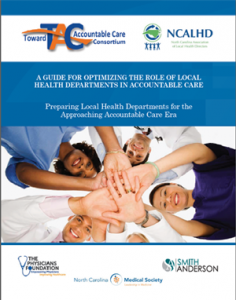 The Toward Accountable Care (TAC) Consortium and Initiative, spearheaded by the North Carolina Medical Society Foundation (NCMSF), this week released its 24th Accountable Care Organization (ACO) Toolkit. This guide focuses on the contributions of local health departments to a successful ACO. Download the guide here.
The Toward Accountable Care (TAC) Consortium and Initiative, spearheaded by the North Carolina Medical Society Foundation (NCMSF), this week released its 24th Accountable Care Organization (ACO) Toolkit. This guide focuses on the contributions of local health departments to a successful ACO. Download the guide here.
These acclaimed toolkits cover 19 specialties as well as five general topics around the formation and success of an ACO. Browse the library of toolkits here.
Toolkits for dermatologists and ophthalmologists will be released soon.
Congratulations to the 2016 NC Doctor of the Year -- Jason Stopyra, MD
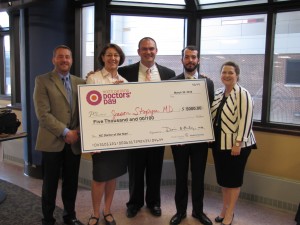
Jason Stopyra, MD, was named 2016 North Carolina Doctor of the Year as part of the NC Doctors’ Day celebration that culminated on March 30, National Doctors’ Day. Dr. Stopyra is an emergency physician, and is Medical Director of Emergency Services in Randolph and Surry Counties and an Assistant Professor at the Department of Emergency Medicine at the Wake Forest Baptist Medical Center in Winston-Salem. He received the most online votes of the 10 NC Doctor of the Year Award finalists making him the winner.
The award comes with a $5,000 prize to be used to further a professional or community project of the winner’s choosing. Dr. Stopyra decided to split the check to benefit five families struggling with serious illness.
At an award reception at Wake Forest Baptist Medical Center on March 30, Dr. Stopyra accepted the award surrounded by family, colleagues, friends and patients.
“I’m so honored and humbled,” he said. “This is an award that really means celebrating the doctor-patient relationship. I’m just the figurehead of that. There are many, many outstanding physicians in North Carolina.”
NC Doctors’ Day is the homegrown celebration of National Doctors’ Day spearheaded by the North Carolina Medical Society (NCMS). Starting in February, patients, colleagues, family and friends nominated doctors who exemplify the best qualities of caring, compassion, clinical expertise and community involvement. This year over 300 doctors were nominated through the NC Doctors’ Day website (www.ncdoctorsday.org). In mid-March 10 finalists were selected to participate in an online voting contest. These extraordinary physicians represent various specialties and are from across North Carolina. See their profiles here.
The nomination for Dr. Stopyra caught the finalist selection committee’s attention, singing his praises as a clinician, mentor and a compassionate community leader:
“His compassion and care toward all patients is outstanding. He is a great emergency department physician and a great mentor to anyone interested in any part of the medical field,” one nominator wrote.
Approximately 11,400 online votes were cast during the voting phase with Dr. Stopyra receiving nearly 3,300.
NC Physicians: Share Your Thoughts with the Physicians Foundation and Be Entered to Win
 Have a strong opinion about physician independence or employment? What about quality reporting? Or EHRs? Now is your chance to be heard and for media and policymakers to take note. By taking just a few minutes now to complete this survey, you are joining your colleagues in letting the world know what health care trends are playing out in North Carolina and what sets North Carolina physicians apart.
Have a strong opinion about physician independence or employment? What about quality reporting? Or EHRs? Now is your chance to be heard and for media and policymakers to take note. By taking just a few minutes now to complete this survey, you are joining your colleagues in letting the world know what health care trends are playing out in North Carolina and what sets North Carolina physicians apart.
This is the fourth biennial Physicians Foundation survey. The goal is to have at least 20,000 physicians nationwide take part to make the data scientifically valid. Past surveys have brought the physicians’ perspective to articles, policy initiatives and white papers. This is an important way for the public to know what doctors are thinking. Please complete the survey now.
As an added incentive you’ll be entered in a contest to win one of five $500 Amazon gift cards and one $5,000 Amazon gift card.
Take the SURVEY!
Commissioner Goodwin: Report BCBSNC problems to DOI
North Carolina Insurance Commissioner Wayne Goodwin is specifically asking physician practices to notify the Department of Insurance of any disruptions that Blue Cross Blue Shield of North Carolina’s recent technological problems are causing. Since the first of the year, DOI has assisted thousands of BCBSNC customers who have had major problems securing coverage, making premium payments, receiving accurate membership cards, accessing care, and more. The consumer complaints have been so numerous, that the DOI announced in February it was undertaking a full-scale investigation of BCBSNC.
In order to understand the full scope of the problems that BCBSNC has caused, Commissioner Goodwin wants to ensure DOI also hears about the impact of BCBSNC’s actions on the provider community.
Problems verifying patient benefits, timely responses to authorization requests, claims processing and payment backlogs, and long call center hold times are examples of BCBSNC problems that have been reported to NCMS. If your practice has experienced problems like these or others, please consider contacting DOI’s Consumer Service Division and submitting a complaint.
North Carolina Department of Insurance
Consumer Services Division
Online: http://www.ncdoi.com/Consumer/Consumer_Complaint_Info.aspx
Phone: 855-408-1212
NCMS Weighs in on Proposed ACO Rules
The North Carolina Medical Society (NCMS) recently submitted feedback to the Centers for Medicare and Medicaid Services (CMS) on the proposed revisions to the benchmarking methodologies in the Medicare Shared Savings Program (MSSP). Members of the NC MSSP Council, which is made up of representatives from 15 Accountable Care Organizations and Next Generation ACOs participating in the MSSP in North Carolina, contributed their insights to the NCMS’ response. Currently, there are 19 ACOs that are part of the MSSP in the state.
The benchmarking methodology can mean financial success or failure for many ACOs and these revisions have been long anticipated. The NCMS generally is supportive of the proposed changes, but requested some modification to make the program stronger and encourage continued participation by Accountable Care Organizations (ACO) in North Carolina. Read the comments here.
Comprehensive Care for Joint Replacement Initiative Underway In Certain NC Markets
The Centers for Medicare & Medicaid Services (CMS) began its Comprehensive Care for Joint Replacement (CJR) model on April 1st. This model tests bundled payments coupled with quality measurement targets for an episode of care associated with hip and knee replacements for Medicare patients in order to encourage providers to work together to improve care coordination from the initial hospitalization through the recovery period.
The model holds hospital participants financially accountable for the quality and cost of the defined CJR episode. The episode begins with an admission to a participant hospital for patients discharged under certain DRG codes associated with hip and knee surgeries. The episode will include all Medicare Part A and B costs with certain exclusions for unrelated conditions. At the end of the year, actual spending for the episode is compared to the target episode price defined by CMS. If spending exceeds the targets, hospitals may need to pay back a portion of the overspending.
Although this model places hospitals ultimately at financial risk for overspending, the hospitals are encouraged to work with physicians and other providers involved in the care during the episode. Hospitals may share in payments received by CMS if additional payments are received for beating the CMS spending target.
The demonstration will last 5 years and is mandatory for identified hospitals located in certain Metropolitan Statistical Areas (MSAs). The included North Carolina MSAs are Asheville, Charlotte, Durham/Chapel Hill and Greenville.
Read more about this program on the CMS Innovation Center webpage. Although there is currently proposed legislation to delay the start of this program, the program began as scheduled on April 1, 2016. Visit our Quality Time with the NCMS blog often for updates.
Now Is The Time to Review/Dispute Open Payments Information
The Centers for Medicare and Medicaid Services (CMS) recently announced the beginning of the 45 day Open Payments Review and Dispute period. After the conclusion of the review and dispute period on May 15, CMS will publish the 2015 payment data and updates to the 2013 and 2014 data on June 30, 2016. Physicians planning to review their 2015 Open Payments Data should test their CMS Enterprise Portal (EIDM) logon credentials beforehand. Locked accounts and other logon issues can be addressed by visiting Frequently Asked Questions for EIDM Users.
Please refer to this CMS guide for step-by-step instructions on how to register to review and dispute your data. For answers to additional questions, please email Medicare’s Open Payment Help Desk at [email protected], or call (855) 326-8366.
Catawba Valley CME Program Awarded Accreditation with Commendation
The North Carolina Medical Society’s (NCMS) Medical Education Committee, chaired by longtime NCMS member Darlyne Menscer, MD, recently awarded the Catawba Valley Medical Center’s, CME program accreditation with commendation. This is the highest level of accreditation.
The NCMS Medical Education Committee studies issues pertinent to medical education, including continuing education and programs for accreditation of providers of intrastate continuing medical education. It is designated by the Accreditation Council for Continuing Medical Education as the accreditor for local CME programs.
Congratulations to Catawba Valley Medical Center!
NCMS Part of Business NC Health Care Roundtable
 North Carolina Medical Society (NCMS) CEO Robert W. Seligson participated in Business North Carolina’s 2016 Health Care Roundtable on Tuesday, March 29 at High Point University. The discussion, which was recorded, will be featured in the May issue of the magazine. Topics discussed ranged widely from the impact of the Affordable Care Act on the state’s economy to electronic medical records and caring for the state’s underserved populations.
North Carolina Medical Society (NCMS) CEO Robert W. Seligson participated in Business North Carolina’s 2016 Health Care Roundtable on Tuesday, March 29 at High Point University. The discussion, which was recorded, will be featured in the May issue of the magazine. Topics discussed ranged widely from the impact of the Affordable Care Act on the state’s economy to electronic medical records and caring for the state’s underserved populations.
Seligson was at the table with Cody Hand of the NC Hospital Association, Brian Canfield of FirstHealth of the Carolinas, Tina Gordon of the NC Nurses Association and Daniel Erb, dean of the Congdon School of Health Sciences at High Point University.
Watch for the coverage of this exchange of ideas in May.
Survey on Perinatal Mental Health In North Carolina
A team at North Carolina State University is assessing perinatal mental health resources in North Carolina and needs your help.
They are reaching out to professionals who provide services to pregnant and postpartum women and asking them to complete a 5-10 minute online survey. Recently, the US Preventive Services Task Force recommended universal depression screening for perinatal women to improve maternal mental health. Unfortunately, many professionals and their patients don't know who to turn to once a woman has been identified with a mental health need. In fact, lack of knowledge regarding treatment resources is a significant barrier to treatment following a positive screening of a postpartum mood disorder (Goodman, 2009; Ko, Farr, Dietz & Robbins, 2012; O’Mahen & Flyne, 2008).
To address this barrier and improve perinatal mental health in North Carolina, this study seeks to assess the resources across the state. The initial aim of the study is to identify all perinatal mental health resources in the state and aggregate the results to determine areas in which resources are insufficient. A secondary aim of the study is to develop a state-wide referral list of perinatal mental health providers and programs. You do not have to be included in the referral list in order to participate.
The researchers are interested in learning more about your services as well as the programs and professionals to whom you refer. The study is open to individuals or agencies who screen, refer, or treat women experiencing mental health symptoms in the perinatal period (during pregnancy or the year following delivery). Please take a few minutes to complete this short survey and forward this email along to anyone you know who serves perinatal women. Your participation is greatly appreciated.
Take the survey.
In the News
Oklahoma Medical Association Urges Physicians To Consider Dropping Medicaid Patients Due to 25 Percent Rate Cut, Becker's Hospital Review, 4-1-16
American Medicine's 'Go to the ER' Mentality, MedPage Today, 3-31-16
Obama To Address Nation's Growing Opioid Problem, The Washington Post, 3-29-16
As Crisis Rages, Hospital Works to Reduce Opioids in ER, The New York Times, 3-28-16
Federal Officials, Advocates Push Pill-Tracking Databases, Modern Healthcare, 3-28-16
Four-Legged Healers Soothe Hospital's Stressed Out Docs, Nurses, The Washington Post, 3-23-16
YMCA-Based Program Reduces Risk of Diabetes, NPR, 3-23-16
Learning Opportunities
North Carolina Medical Society Foundation, in cooperation with the North Carolina Medical Group Managers, National Rural Accountable Care Consortium, and CHESS invites you to learn how the Transforming Clinical Practice Initiative (TCPI) will prepare practices and clinics for value-based payment models at a ‘Lunch and Learn’ webinar on April 13 from noon to 1 p.m. It will feature Monica Bourgeau, Executive Director, and Kathy Whitmire, Regional Vice President, of the National Rural Accountable Care Consortium. Register here. This webinar is free but you must be registered to attend. Space is limited so register early!
NCTracks training opportunities for April include:
Friday, April 8 – 1 to 4 p.m. - Submitting a Professional Claim will focus on how to submit a Professional Claim via the NCTracks Provider Portal. The course is being offered in-person at the CSC facility in Raleigh. It includes hands-on training and will be limited to 45 participants.
Friday, April 15 – 9 a.m. to noon - ES User Role_Abbreviated MCR_Upload Documents (WebEx) will guide providers through the enhancements to the provider enrollment application processes.
Friday, April 22 - 9:30 a.m. to noon - Prior Approval - Medical (Professional) will cover submitting Prior Approval (PA) Requests to help ensure compliance with Medicaid clinical coverage policy and medical necessity. It will also cover Prior Approval inquiry to check on the status of the PA Request. The course is being offered in-person at the CSC facility in Raleigh. It includes hands-on training and will be limited to 45 participants.
Wednesday, April 27 - 1 to 4 p.m. - Provider Web Portal Application will guide providers through the process of submitting all types of provider applications found on the NCTracks Provider Portal. The course is being offered in-person at the CSC facility in Raleigh. It includes hands-on training and will be limited to 45 participants.
The Carolinas Center and the Virginia Association for Hospices and Palliative Care are offering the 2016 Palliative Care Symposium, Support for a Lifetime: Palliative Care Across the Continuum, April 7 at the William and Ida Friday Center, University of North Carolina-Chapel Hill. More information here. The early registration deadline is March 17.
Centers for Medicare and Medicaid Services will host a call on Tuesday, April 12 from 2:30 to 3:30 p.m. on Open Payments 2016: Prepare to Review Reported Data Call. To register: visit MLN Connects Event Registration. Space may be limited, register early. The industry is currently submitting data to the Open Payments System on payments or transfers of value made to physicians and teaching hospitals during 2015. When data submission ends, physicians and teaching hospitals are given 45 days to review and dispute records attributed to them. In order to review the data, physicians and teaching hospitals need to register in the Open Payments system. The system is available for physician and teaching hospital registration. The review and dispute period will begin in April 2016 and last for 45 days. CMS will publish the 2015 payment data and updates to the 2013 and 2014 data on June 30, 2016.
The Western Carolina Medical Society is offering the “Heart of the Healer” Retreat to equip physicians with practical and field-tested tools to reduce and prevent burnout on Saturday, April 16th 2016 at Montreat Conference Center in Montreat, NC. Earn up to 4.5 hours of CME; spouses/significant others invited; childcare available (ages 3+). Event details and registration is available at www.mywcms.org/burnout2016 or call us at 828-274-2267 ext. 1313 to see if there is still space available.
USF Health and i3 Health are hosting the 2nd Annual Hematologic Malignancies Symposium in Asheville on April 16 at the Asheville Renaissance Hotel. This live 1-day CME/CE-certified meeting is targeted towards medical oncologists, hematologists, oncology advanced practitioners, oncology nurses and other health care professionals involved in the treatment of gastrointestinal malignancies. Participants will receive expert insights from leading investigators in treatment selection and supportive care best practices for patients with hematologic malignancies. More information and register here.
USF Health and i3 Health are hosting the 1st Annual Gastrointestinal Malignancies Symposium in Asheville on April 16 at the Asheville Renaissance Hotel. This live 1-day CME/CE-certified meeting is targeted toward medical oncologists, surgical oncologists, radiation oncologists, oncology advanced practitioners, oncology nurses and other health care professionals involved in the treatment of patients with gastrointestinal malignancies. More information and register here.
Community Care of North Carolina’s (CCNC) 2016 Innovation Forum will be held April 18 at the McKimmon Center at North Carolina State University in Raleigh. Click here to register.
The Centers for Medicare and Medicaid Services (CMS) will host a call on Medicare Shared Savings Program ACO Application Process on Tuesday, April 19 from 1:30 to 3 pm. To Register: Visit MLN Connects Event Registration. Space may be limited, register early. During this call, CMS subject matter experts cover helpful tips to complete a successful application for the Medicare Shared Savings Program (Shared Savings Program). A question and answer session will follow the presentation.
The Centers for Medicare and Medicaid Services (CMS) will host a call on 2016 PQRS Reporting: Avoiding 2018 Negative Payment Adjustments, on Thursday, April 21 from 3-4:30 p.m. To register visit MLN Connects Event Registration. Space may be limited, register early. This call gives an overview of the 2016 Physician Quality Reporting System (PQRS) and related resources. The presentation will cover guidance and instructions on how individual eligible professionals and PQRS group practices can get started, satisfactorily report/participate, and avoid the 2018 PQRS negative payment adjustment.
2016 Addiction Medicine Conference, April 22-23 in Asheville, will once again provide up-to-date substance abuse related education, applicable across general medical as well as addiction specialty practices. New this year is a Pre-Conference day on April 21 including two longer, skill-based workshops: Motivational Interviewing: A Foundation for Helping Patients with Substance Use Problems and The ABCs of Pain Management: Skills for the Specialist and Non-specialist Alike. Register Today! For more information contact Shaquita Basemore at 919-256-7416.
The Pain Society of the Carolinas (PSOC) urges you to save the dates for several other courses on pain management.
DUKE Pain Meeting, on April 29-May 1, covering cancer pain, palliative care and end-of-life. To be held at the Friday Center in Chapel Hill. CLICK HERE to Register. The FREE Safe Opioid Prescribing Course is immediately preceding the DUKE Pain meeting and satisfies CE requirements in NC and SC.
Save the date for the PSOC Annual Meeting, Sept. 25, at The Omni Grove Park Inn, Asheville NC.
Greensboro AHEC is offering a day long course titled “What Do I Say? A Course in Talking About Death and Dying on April 22 OR Nov. 4, at The John A. Lusk, III, MD Caregiving Education Center – the Lusk Center 2501 Summit Avenue, Greensboro, NC. More information and register here.
NCHICA 9th Thought Leader Forum, The Internet of Things: Managing, Analyzing & Applying the Data
April 27, 2016, 9:30-11:30 am, Research Triangle Foundation, RTP, NC. Topics and presenters include: How to Manage IoT Data — Joseph Hobbs, Regional CIO, NetApp Healthcare; Applying Analytics to IoT Data — Carol Rigsbee, Quality Manager, SAS; How to Move Your IoT Research Data from Pilot to Platform — John Reites, Head of Digital Health Acceleration, Quintiles; Moderator: Billy Willis, Chief Technology Officer, Duke University Health System. The cost is $50 NCHICA members/$75 non-members/$25 students. Click here to register.
The NC MGMA will hold its Annual Conference, May 11-13, in Charleston, SC. This year’s conference, “Making Connections,” will tie together the various aspects of what health care administrators are challenges with every day featuring content on finance, customer service, legal, social media and human resources. The Practice of the Year Award also will be presented at this gathering. Learn more and register.
MAHEC, working with the North Carolina Academy of Family Physicians, The Governor's Institute on Substance Abuse and Project Lazarus: A Project of CCNC, is offering A Guide to Rational Opioid Prescribing for Chronic Pain, an online education course. The course is designed for all prescribing health care practitioners who are interested in an overview of the rational prescribing approaches for persons with chronic pain disorders. It will fulfill the North Carolina Medical Board’s requirement of at least one hour of continuing education designed specifically to address prescribing practices for chronic pain management. The course cost is $15 for the first 6 months. Offers 3 hours of AAFP, AMA/AAFP Equivalency, and CDE; www.mahec.net/opioid
Watch seven new MLN Connects videos on the Medicare Quality Reporting Programs, focusing on the requirements you need to meet in 2016. For those who participated in the webinars held in February, the information in these modules mirrors the information shared on those calls:
Introduction: Medicare Quality Reporting Programs: What Eligible Professionals Need to Know in 2016. Run time: 15 minutes.
Module 1: Medicare Access and CHIP Reauthorization Act (MACRA) Preview. Run time: 6 minutes.
Module 2: 2016 Incentive Payments and 2018 Payment Adjustments. Run time: 9 minutes.
Module 3: 2016 Physician Quality Reporting System (PQRS) Updates. Run time: 20 minutes.
Module 4: 2018 Value-Based Payment Modifier (VM) Policies. Run time: 17 minutes.
Module 5: Physician Compare Updates in 2016. Run time: 6 minutes.
Module 6: Meaningful Use of Certified Electronic Health Record Technology (CEHRT) in 2016. Run time: 16 minutes.
NCMS Talking Points on Draft Medicaid Reform Waiver
The North Carolina Medical Society (NCMS) has formulated talking points (PDF) to help you as you prepare for the North Carolina Department of Health and Human Services' (DHHS) statewide listening tour to get feedback on their draft Medicaid reform waiver application to the Centers for Medicare and Medicaid Services (CMS). The listening session tour begins next Wednesday, March 30 in Raleigh. Here is the list of tour dates. We encourage everyone to participate. Click here for the talking points. If you have questions or comments please email the NCMS at [email protected].
To read the waiver application and learn more about the Medicaid reform process, visit DHHS' Medicaid reform website.
NCMS Board Hears Another Perspective On CON
At its meeting last weekend in Wilmington, the North Carolina Medical Society (NCMS) Board of Directors heard another perspective on Certificate of Need (CON) reform. Bret Nicks, MD, Chief Medical Officer at Wake Forest Baptist Hospital - Davie Medical Center and the current president of the NC College of Emergency Physicians (NCCEP) and Jennifer Raley, MD, managing partner and vice president of Wake Emergency Physicians, PA (WEPPA), and the incoming president of NCCEP told the Board that the current CON law should not be changed as it provides a safety net for patients.
“We know this is a divisive issue. We know you’re in a tough position,” Dr. Nicks told the Board. Removing the current CON provisions in North Carolina would weaken hospitals’ ability to remain financially viable and to treat everyone as they are required to do under EMTALA, he said. “Strong hospital systems are critical to provide quality care to patients. They provide a safety net.”
The Board welcomes input on the issues surrounding CON from all perspectives. At their meeting in January, Board members heard from representatives of the North Carolina Orthopaedic Association, who argued the CON law is outdated and needs to be reformed to better accommodate the move to value-based models of care.
As of now, the Board continues to actively discuss what approach to take on CON. In the meantime, please review the NCMS’ current policy, which was adopted in 1999 after review by a task force led by Chris Ullrich, MD, a Charlotte area radiologist. The basis of this policy is ‘fairness.’ Read the NCMS policy here (PDF).
More recently in 2013, the Surgical Facilities Task Force, chaired by former NCMS President John Mangum, MD, a family physician in Sanford, came up with a list of consensus points among the diverse specialties represented on the Task Force. Read the consensus points here.
NCMS Board De-Briefed on Important Health Care Issues of the Day
The North Carolina Medical Society (NCMS) Board of Directors had a full agenda when they met in Wilmington last weekend. Besides meeting with physicians from the eastern region of the state, the Board also heard from prominent guests who brought them up to speed on several important issues.
Workforce: NCMS Board Member Michelle Jones, MD, along with Warren Newton, MD, MPH, Director of the North Carolina Area Health Education Centers (AHEC) Program and Vice Dean for the UNC School of Medicine and senior medical advisor to the NC Department of Health and Human Services on Medicaid reform, spoke to the board about health care workforce issues in North Carolina.
“Care transformation will require a very different workforce,” Dr. Newton told the Board. AHEC is pushing for additional investment by the state in General Medical Education, he said, adding that focusing that investment on the residency experience is key to keeping doctors in the state after they finish their training.
Physician wellness: The Board also heard from Warren Pendergast, MD, and Joseph Jordan, Ph.D. from the NC Physicians Health Plan (PHP). They delivered their annual report to the NCMS, offering statistics on the number and type of referrals to PHP.
For 2015 there were 171 individuals referred to PHP. Of those, the breakdown for type of referral is:
- Substance use disorders: 63 percent
- Psychiatric: 11 percent
- Behavioral: 14 percent
- Professional Sexual Misconduct: 2 percent
- Other: 10 percent
The North Carolina Medical Board is the biggest source of referrals at 35 percent with self-referral next at 26 percent. Total percentage of those successfully completing the program is 88 percent.
PHP also is spearheading a wellness initiative through the newly formed NC Coalition for Physician Resilience and Retention of which the NCMS is a part. The goal is to develop programs to help physicians experiencing issues with stress and burnout.
Updates from Blue Cross and Blue Shield of North Carolina: BCBSNC Senior Vice President and Chief Financial Officer Gerald Petkau spoke about the much-publicized problems the insurer has been having with verifying eligibility for their members.
“We recognize the issues with NCMS members as well,” Petkau said. “We’re sorry for that disruption.” He also commented on the NC Department of Insurance investigation of BCBSNC, noting that they are cooperating fully and are conducting their own internal review as well.
He also spoke about the challenges BCBSNC is facing with the Affordable Care Act (ACA). The company lost $282 million on their ACA business, he said. ACA patients are less healthy, use expensive health services and visit the ER at twice the rate of other customers. The sickest 5 percent incurred $1.29 billion in claims, he said.
To meet these challenges, Petkau said the options are to modify the products or withdraw from the ACA marketplace completely. The final determination will be made late in summer, he said.
“There are a lot of challenges and a lot of turmoil,” he said. “We are still optimistic. At Blue Cross Blue Shield we’ve seen some success with bundled payments and with ACOs.”
Petkau also advocated for more data exchange as practices move away from fee-for-service to value-based models.
“We have claims data; you all have encounter data. We need to share data,” he said.
Eastern NC Gathering a Success
 On a sunny spring evening, more than 50 physicians and physician assistant members and potential members gathered at the Hilton Riverwalk Terrace in Wilmington to ‘mix and mingle’ with each other and members of the North Carolina Medical Society (NCMS) Board of Directors. With the NCMS’ new governance system making the Board the policy-making body, this was an opportunity to discuss issues of importance in a casual, friendly setting.
On a sunny spring evening, more than 50 physicians and physician assistant members and potential members gathered at the Hilton Riverwalk Terrace in Wilmington to ‘mix and mingle’ with each other and members of the North Carolina Medical Society (NCMS) Board of Directors. With the NCMS’ new governance system making the Board the policy-making body, this was an opportunity to discuss issues of importance in a casual, friendly setting.
Just before the social gathering, the NCMS Board met with representatives of the New Hanover Pender County Medical Society to hear their thoughts and concerns. NCMS staff gave brief updates on Medicaid reform and scope of practice issues.
Darrell Hester, MD, an ophthalmologist in Wilmington, asked what the role of the county societies is in this new system.
“How do we put our intellects together and do something good with it?” Dr. Hester asked. He also wondered what the voting process would be for officers and the Board. NCMS Deputy EVP Shawn Scott reported that a firm has been hired to distribute and tally ballots from the NCMS membership for the available Board positions. The NCMS would hold its annual business meeting to install the newly elected officers as part of the new M3 Conference on Saturday, Sept. 17, at the Grandover Resort and Hotel in Greensboro. [See article on the conference in this issue of the Bulletin.]
“We need to be a responsive, inclusive policymaking body,” said NCMS Board member Jeff Runge, MD. “This board understands its fiduciary responsibility to its constituents. We’ve been responsive when groups of people have requested to come speak to the Board. I hope that the word gets out that this process only works if the groups participate. Communication is very important.”
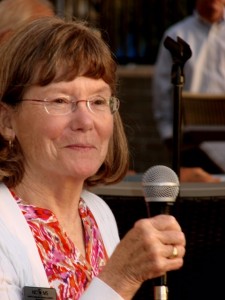
Schedule of upcoming Board events:
- May 13-15, Cary
- July 15-16, Charlotte
- 15-18, Greensboro
- 3, Raleigh
You also may submit your policy suggestions and concerns to the Board via our online form. Remember to watch your Bulletin and email for other opportunities to weigh in on issues of importance to you and your profession.
Progress On RAC Audit Reform
North Carolina Medical Society (NCMS) CEO Robert W. Seligson met last week with Nicholas Uehlecke, the Chief of Staff for the House Ways and Means Committee to discuss the evolving RAC audit legislation. The NCMS, through Representative George Holding (R-NC), had pushed to sponsor a bill to amend the law pertaining to RAC audits in response to member concerns and their firsthand experiences with inequities in the RAC audit process.
Uehlecke was very open and accommodating to NCMS concerns, and asked that we continue to provide examples of unfair RAC audits. He is working closely with the House Ways and Means Committee and the Centers for Medicare and Medicaid Services (CMS) to craft appropriate language to address unfairness in the process.
If you have participated in an audit that you felt was handled unfairly or inappropriately, please contact the NCMS immediately at [email protected] or calling 919-833-3836 x142. Thank you for your support in this effort!
CMS Releases 2016 Value-Based Payment Modifier Results
The Centers for Medicare and Medicaid Services (CMS) recently released the 2016 Value-Based Payment Modifier (VBPM) results. Medicare Administrative Contractors (MACs) will begin paying claims to reflect the VBPM results with updated payment amounts after March 14, 2016. CMS anticipates practices will start seeing the adjustments on their claims within the next six weeks. CMS will need to reprocess 2016 claims with dates of service that were paid prior to this date. Also, those with pending informal review decisions may see later changes as a result of CMS’ final determination. CMS reports that over 1,000 groups still have a PQRS or VBPM informal review pending.
In 2016, all practices with 10 or more eligible professionals (EPs) are subject to the VBPM based on their 2014 performance data. The VBPM is a program that started in 2015, when the modifier applied to practices of 100 or more EPs only. This modifier will adjust Medicare Part B payments based on performance compared to national averages on quality and cost data. Learn more about how CMS calculates quality and cost performance for this programs by clicking on the VBPM tab of this blog. This performance information is also highlighted in the 2014 Quality and Resource Use Reports (QRUR), which can be accessed through the CMS QualityNet website.
Below are some highlights from the overall 2016 VBPM results shared by CMS:
- 128 groups out of 13, 813 total groups impacted by the VBPM exceeded the program’s benchmarks for quality and cost and will receive an increase of 15.92 percent (70 groups) or 31.84 percent (58 groups) depending on their performance score.
- 59 groups did not meet performance thresholds and will see a -1 percent or -2 percent decrease in 2016 payments made under the Medicare Physician Fee Schedule depending on their performance score.
- Approximately 5,500 groups will receive a 2 percent penalty in 2016 for not reporting the required PQRS data in order for CMS to calculate VBPM scores. Note that this penalty will be applied in addition to the separate PQRS penalty a physician would also be assessed for not meeting the minimum reporting criteria in the PQRS program.
- A majority of groups (8,208) will see no changes to their payments. This was often a result of having insufficient valid data for CMS to make quality and/or cost calculations.
In 2017, the VBPM will apply to practices of all sizes as well as individual physicians. Take a look at our resources on the Quality Time with the NCMS blog to better understand how this program will impact you in the coming years. As a result of the Medicare Access and Chip Reauthorization Act (MACRA), the VBPM program will sunset in December 2018 when CMS will transition to the new Merit-Based Incentive Payment System. Learn more about what this critical legislation does to reform the Medicare payment program by clicking on the MACRA tab of this blog.
Have questions? Contact us at [email protected].
Exciting Speaker Line-up for M3 Conference
 The line-up of speakers for the M3 – Merging Medicine and Management – Conference in Greensboro on Sept. 15-18 is taking shape and promises three days of interesting and inspiring content.
The line-up of speakers for the M3 – Merging Medicine and Management – Conference in Greensboro on Sept. 15-18 is taking shape and promises three days of interesting and inspiring content.
Back by popular demand, Wayne Sotile, Ph.D., the founder of The Center for Physician Resilience, in Davidson, NC, will continue the conversation about physician wellness. He was a highlight of last year’s NCMS Annual Meeting. Also focusing on this important topic will be Sean Foy, an exercise physiologist, behavioral coach and international authority on fitness, weight management and healthy living.
Director of the NCMS Foundation’s Kanof Institute for Physician Leadership, Kristina Natt Och Dag, will lead the track on leadership development.
With the move to value-based models of care, several speakers including Jeff James, CEO at Wilmington Health and Stephen Nuckolls, CEO at Coastal Carolina Health Care will describe their experience as part of an accountable care organization and the opportunities and challenges such a value-driven model presents.
David Sousa, Chief Operating Officer at Medical Mutual Insurance Company, will speak on how to manage your digital reputation.
Christopher Grubb, MD, an anesthesiologist and pain management consultant out of Greenville, NC, will offer a session on opioid prescribing.
Legislative updates and national speakers offering insight into the November elections, which will be held just a few weeks after the M3 Conference, also will be at the M3 Conference.
Will you be there with your physician and medical practice management team? Mark your calendar and plan to be at the M3. Watch the NCMS Bulletin for more updates on the programming for the conference.
Be Heard. Take The Physicians Foundation Survey
 Watch your mailbox for The Physicians Foundation Biennial Survey, and then be sure to complete it! Or complete the survey online now.
Watch your mailbox for The Physicians Foundation Biennial Survey, and then be sure to complete it! Or complete the survey online now.
If you have an opinion about the state of health care today, then this biennial survey is your opportunity to make your voice heard. The Physicians Foundation Survey of America’s Physicians is one of the largest physician surveys ever undertaken in the United States. The results of past surveys have helped lawmakers, influential health care policymakers and the media better understand your perspective and the challenges you face. Take a few minutes to complete this survey to add your voice to the thousands of other physicians nationally.
Those who respond to the survey will be entered to win one of five $500 Amazon gift cards and one $5,000 Amazon gift card. The survey is being conducted by national physician search and consulting firm, Merritt Hawkins, and will be emailed to more than 650,000 physicians across the country from March-May of 2016.
Take the survey.
To access the results of previous Physicians Foundation surveys, visit www.physiciansfoundation.org. The Physicians Foundation is a non-profit organization that seeks to empower physicians to lead in the delivery of high-quality, cost-efficient health care. This is the fourth national survey the Foundation has undertaken, and covers topics such as health reform, electronic medical records, new methods of physician reimbursement, ICD-10 and others. A full copy of the final survey report will be emailed to all physicians who participate.
Updated Zika Virus Guidance
The North Carolina Division of Public Health has issued updated guidance on the Zika virus. This includes more specific information about risk of exposure in areas with active transmission and links to updated laboratory biosecurity information and guidance. Procedures for receiving approval and submitting specimens for testing have not changed. Read the latest memo.
Ocular Melanoma Cluster in Huntersville
Longtime North Carolina Medical Society (NCMS) member and co-founder of the NCMS Foundation’s Leadership College Michael Brennan, MD, has convened a team of eye care and cancer specialists to explore the cluster of ocular melanoma (OM) cases around Huntersville and to encourage Huntersville-area high school students to undergo thorough eye exams through a free eye exam program Dr. Brennan helped to organize.
The Huntersville region has a statistically aberrant link to OM, an extremely rare cancer, diagnosed in approximately 2,500 people each year nationwide. It occurs most often in patients 50 or older, and usually strikes men more often than women.
In the last six years, however, more than 12 individuals with residential or occupational ties to Huntersville, most of them women and most much younger than the average OM patient, have been diagnosed with the cancer. Three of the youngest victims, graduated from Hopewell High School, which opened in 2001.
The media in the area has been covering this strange phenomenon and Dr. Brennan’s efforts to study the cluster and bring free eye exams to the area. Read one of the media reports here.
CQU Team Wins First Place
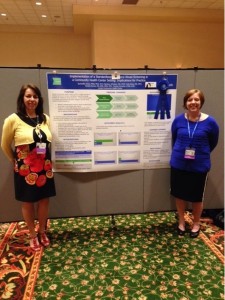
The team of clinicians from the Lincoln Health Center in Durham, who are participating in the Kanof Institute for Physician Leadership’s Clinical Quality University (CQU) program, won first place at the recent Duke Safety and Quality Conference. The CQU team is made up of Quincy Jones, MSW, MHS, PA-C, who is also part of the NCMS Foundation’s Community Practitioner Program, which is funding the team; Barbara Johnston, MD, Sandra Gomez, RN and Carolyn Crowder.
Their poster titled “Implementation of a Substance Abuse Screening in a Community Health Center Setting: Implications for Practice” won first place in the “Effective” category, which means providing services based on scientific knowledge to all who can benefit, and refraining from providing services to those not likely to benefit. The poster was directly based on the project they did as part of the CQU program.
“It was certainly exciting for us,” Jones said. “We are truly appreciative for the learning and guidance afforded to us through CPP and CQU!”
Cast Your Vote for NC Doctor of the Year By Sunday
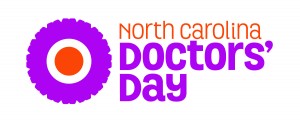 The 2016 NC Doctors' Day celebration is nearing it's exciting culmination with the presentation of the NC Doctor of the Year Award on National Doctors' Day, March 30. Cast your vote for one of the 10 finalists for the award at www.ncdoctorsday.org before the polls close this Sunday, March 27. And be sure to tell your friends, family and colleagues to do the same.
The 2016 NC Doctors' Day celebration is nearing it's exciting culmination with the presentation of the NC Doctor of the Year Award on National Doctors' Day, March 30. Cast your vote for one of the 10 finalists for the award at www.ncdoctorsday.org before the polls close this Sunday, March 27. And be sure to tell your friends, family and colleagues to do the same.
Happy Doctors' Day!
In the News
Scientists Discover Non-Opioid Pathway In the Brain, National Institutes of Health, 3-17-16
Patients in Pain and a Doctor Who Must Limit Drugs, The New York Times, 3-16-16
Doctors Ponder Delicate Talks As Medicare Pays for End-of-Life Counsel, Kaiser Health News, 3-16-16
CDC Opioid Prescribing Guidelines Unlikely To Affect Physicians' Practices, Modern Healthcare, 3-15-16
Getting Pain Killers Seems Easy; Getting Help To Fight Painkiller Addiction Is Hard, The Washington Post, 3-14-16
Value-Based Care Is Ripping Into Health System Profits, MedPage Today, 3-13-16
Med Students Are Facing Up To the Rising Price of Education, But How Are They Managing the Debt?, Healthcare Dive, 3-13-16
States Move To Control How Painkillers Are Prescribed, The New York Times, 3-11-16
What California Providers Will Do When Asked to Help Patients Die, Modern Healthcare, 3-11-16
Senate Passes Opioid Bill With No Funding Attached, Modern Healthcare, 3-10-16
What Happens When It's Easier to Visit the Doctor? We Do, The Washington Post, 3-10-16
Physician Burnout is a Public Health Crisis, Ethicist Says, Medscape, 3-4-16
Learning Opportunities
The Centers for Medicare & Medicaid Services (CMS) will present a three-part Virtual Office Hours series regarding 2016 Physician Quality Reporting System (PQRS) quality measures including sessions covering topics related to PQRS measures, such as explaining what a quality measure is, measures-related resources, and next steps for participation in 2016 PQRS.
The first session, titled “2016 PQRS Reporting: Introduction to Quality Measures Reporting (session 1 of 3)”, will take place on Tuesday, March 29, 2016 from 1 to 2 p.m. ET. Topics to be discussed in this session include How to Get Started with PQRS and what are claims/qualified registry clinical quality measures. To register to participate in this session, click here to access the registration page.
NCTracks training opportunities for April include:
Friday, April 1 - 1 to 2:30 p.m. - Managed Care Referrals and Overrides shows authorized users how to submit Managed Care Referrals and inquire about Managed Care Referrals and Overrides. This course will be offered at the CSC facility in Raleigh. It involves hands-on training and will be limited to 45 participants.
Tuesday, April 5 – 1 to 4 p.m. - Provider Web Portal Applications (WebEx) will guide providers through the process of submitting all types of provider applications found on the NCTracks Provider Portal. This course is taught via WebEx and can be attended remotely from any location with a telephone, computer and internet connection. The WebEx will be limited to 115 participants.
Friday, April 8 – 1 to 4 p.m. - Submitting a Professional Claim will focus on how to submit a Professional Claim via the NCTracks Provider Portal. The course is being offered in-person at the CSC facility in Raleigh. It includes hands-on training and will be limited to 45 participants.
Friday, April 15 – 9 a.m. to noon - ES User Role_Abbreviated MCR_Upload Documents (WebEx) will guide providers through the enhancements to the provider enrollment application processes.
Friday, April 22 - 9:30 a.m. to noon - Prior Approval - Medical (Professional) will cover submitting Prior Approval (PA) Requests to help ensure compliance with Medicaid clinical coverage policy and medical necessity. It will also cover Prior Approval inquiry to check on the status of the PA Request. The course is being offered in-person at the CSC facility in Raleigh. It includes hands-on training and will be limited to 45 participants.
Wednesday, April 27 - 1 to 4 p.m. - Provider Web Portal Application will guide providers through the process of submitting all types of provider applications found on the NCTracks Provider Portal. The course is being offered in-person at the CSC facility in Raleigh. It includes hands-on training and will be limited to 45 participants.
Centers for Medicare and Medicaid Services will host a call Tuesday, April 5 from 1:30 to 3 pm ET, “Medicare Shared Savings Program ACO: Preparing to Apply for 2017” Visit MLN Connects Event Registration to register. Space may be limited, register early. During this call, CMS subject matter experts provide information on what you can do to prepare for the Medicare Shared Savings Program (Shared Savings Program) application process for the January 1, 2017, program start date. A question and answer session will follow the presentation.
The Carolinas Center and the Virginia Association for Hospices and Palliative Care are offering the 2016 Palliative Care Symposium, Support for a Lifetime: Palliative Care Across the Continuum, April 7 at the William and Ida Friday Center, University of North Carolina-Chapel Hill. More information here. The early registration deadline is March 17.
Centers for Medicare and Medicaid Services will host a call on Tuesday, April 12 from 2:30 to 3:30 p.m. on Open Payments 2016: Prepare to Review Reported Data Call. To register: visit MLN Connects Event Registration. Space may be limited, register early. The industry is currently submitting data to the Open Payments System on payments or transfers of value made to physicians and teaching hospitals during 2015. When data submission ends, physicians and teaching hospitals are given 45 days to review and dispute records attributed to them. In order to review the data, physicians and teaching hospitals need to register in the Open Payments system. The system is available for physician and teaching hospital registration. The review and dispute period will begin in April 2016 and last for 45 days. CMS will publish the 2015 payment data and updates to the 2013 and 2014 data on June 30, 2016.
The Western Carolina Medical Society is offering the “Heart of the Healer” Retreat to equip physicians with practical and field-tested tools to reduce and prevent burnout on Saturday, April 16th 2016 at Montreat Conference Center in Montreat, NC. Earn up to 4.5 hours of CME; spouses/significant others invited; childcare available (ages 3+). Event details and registration is available at www.mywcms.org/burnout2016 or call us at 828-274-2267 ext. 1313 to see if there is still space available.
USF Health and i3 Health are hosting the 2nd Annual Hematologic Malignancies Symposium in Asheville on April 16 at the Asheville Renaissance Hotel. This live 1-day CME/CE-certified meeting is targeted towards medical oncologists, hematologists, oncology advanced practitioners, oncology nurses and other health care professionals involved in the treatment of gastrointestinal malignancies. Participants will receive expert insights from leading investigators in treatment selection and supportive care best practices for patients with hematologic malignancies. More information and register here.
USF Health and i3 Health are hosting the 1st Annual Gastrointestinal Malignancies Symposium in Asheville on April 16 at the Asheville Renaissance Hotel. This live 1-day CME/CE-certified meeting is targeted toward medical oncologists, surgical oncologists, radiation oncologists, oncology advanced practitioners, oncology nurses and other health care professionals involved in the treatment of patients with gastrointestinal malignancies. More information and register here.
2016 Addiction Medicine Conference, April 22-23 in Asheville, will once again provide up-to-date substance abuse related education, applicable across general medical as well as addiction specialty practices. New this year is a Pre-Conference day on April 21 including two longer, skill-based workshops: Motivational Interviewing: A Foundation for Helping Patients with Substance Use Problems and The ABCs of Pain Management: Skills for the Specialist and Non-specialist Alike. Register Today! For more information contact Shaquita Basemore at 919-256-7416.
The Pain Society of the Carolinas (PSOC) urges you to save the dates for several other courses on pain management.
DUKE Pain Meeting, on April 29-May 1, covering cancer pain, palliative care and end-of-life. To be held at the Friday Center in Chapel Hill. CLICK HERE to Register. The FREE Safe Opioid Prescribing Course is immediately preceding the DUKE Pain meeting and satisfies CE requirements in NC and SC.
Save the date for the PSOC Annual Meeting, Sept. 25, at The Omni Grove Park Inn, Asheville NC.
Greensboro AHEC is offering a day long course titled “What Do I Say? A Course in Talking About Death and Dying on April 22 OR Nov. 4, at The John A. Lusk, III, MD Caregiving Education Center – the Lusk Center 2501 Summit Avenue, Greensboro, NC. More information and register here.
The NC MGMA will hold its Annual Conference, May 11-13, in Charleston, SC. This year’s conference, “Making Connections,” will tie together the various aspects of what health care administrators are challenges with every day featuring content on finance, customer service, legal, social media and human resources. The Practice of the Year Award also will be presented at this gathering (see article in this edition of the Bulletin). Learn more and register.
Have You Voted for NC Doctor of the Year?
 The nominations have been tallied and the top ten physicians named -- it's time to vote for your favorite NC doctor! Visit www.ncdoctorsday.org and learn more about the finalists.
The nominations have been tallied and the top ten physicians named -- it's time to vote for your favorite NC doctor! Visit www.ncdoctorsday.org and learn more about the finalists.
This online award contest is part of the second annual NC Doctors’ Day celebration. The winner is the doctor who garners the most online votes by National Doctors’ Day on March 30. The award comes with a check for $5,000 to be used to further a professional or community project of interest to the winner.
The nomination phase of the contest opened on Feb. 1 and closed on March 4. Over 350 nominations were received – proof positive that this homegrown celebration of North Carolina doctors is catching on and growing and that people appreciate what you do for them every day.
We encourage everyone to show a doctor their gratitude by nominating him or her today for NC Doctor of the Year. Learn more at the NC Doctors' Day website.
NCMS Summarizes Medicaid Reform Draft Waiver
To highlight the important points contained in the state’s draft Medicaid reform waiver application presented last week by the NC Department of Health and Human Services (DHHS) to the Joint Legislative Oversight Committee on Medicaid and NC Health Choice, North Carolina Medical Society (NCMS) staff has thoroughly reviewed the document and written this summary. The draft application must be approved by the Centers for Medicare and Medicaid Services (CMS) in order to implement the Medicaid reforms adopted by the NC General Assembly last fall.
The DHHS has stated repeatedly they are seeking meaningful input on the waiver application from the health care community and have scheduled ‘listening sessions’ throughout the state in March and April. See when officials will be in your area here. Watch the NCMS Bulletin for more information on these sessions and how you can most effectively participate. The waiver application is due to CMS by June 1.
The NCMS is committed to continuing our ongoing, constructive dialogue with DHHS on Medicaid reform to help ensure our priorities are met as the reforms are implemented. Physician leadership remains a key NCMS priority. NCMS staff and our Medicaid Reform Task Force are fully engaged in communicating our priorities to DHHS including the ideal leadership role of physicians in the managed care organizations that will be statewide Medicaid providers under the proposed reform plan. We are taking a constructive approach to answering this challenging question, and look forward to a successful implementation process.
The NCMS wants to hear your feedback. Your input is valuable and will assist us in advocating for changes to the draft waiver to improve the final product which will ultimately be submitted to the CMS for approval. Please share your comments at [email protected].
Visit NC DHHS’ Medicaid reform website for more on the state’s plans.
Read the full draft waiver application.
NCMS draft waiver summary.
NCMS President Testifies on the Importance of Supervision
 NCMS President, Docia Hickey, MD testified before the Joint Legislative Oversight Committee on Health and Human Services (JLOC HHS) on Tuesday to reiterate the importance of physician supervision of Advanced Practice Registered Nurses (APRN) including Nurse Practitioners (NP), Certified Registered Nurse Anesthetists (CRNA) and Certified Nurse Midwives (CNM). Dr. Hickey pointed out the important role that physicians play as extensions of the state to allow for APRNs to practice to the fullest extent of their individualized training and experience.
NCMS President, Docia Hickey, MD testified before the Joint Legislative Oversight Committee on Health and Human Services (JLOC HHS) on Tuesday to reiterate the importance of physician supervision of Advanced Practice Registered Nurses (APRN) including Nurse Practitioners (NP), Certified Registered Nurse Anesthetists (CRNA) and Certified Nurse Midwives (CNM). Dr. Hickey pointed out the important role that physicians play as extensions of the state to allow for APRNs to practice to the fullest extent of their individualized training and experience.
Dr. Hickey, a native North Carolinian, described her own personal journey from growing up in a rural community to practicing as a neonatologist in Charlotte. She addressed questions from committee members concerned about access to health care in rural communities and pointed out that APRNs are dispersed in similar patterns to their physician counterparts across North Carolina. She also pointed out the fact that NPs are moving in greater numbers towards specialization and away from primary care while primary care is the major need in rural communities.
Additionally, Dr. Hickey addressed the rural economic benefits and outcomes of physicians compared to APRNs. While studies show that APRN independent practice would result in increased economic impact, even a modest increase in the number of physicians would have significantly greater impact on North Carolina. The NCMS believes it is necessary to address the core reasons why our population is moving out of rural areas in order to attract all types of professional and services to those areas.
The more than 10,000 hours of clinical training physicians have makes them uniquely qualified to provide this service on behalf of the State. Supervision gives a statutory structure to the team-based care model that has been shown to be successful in NC. As we move to more value-based arrangements of care delivery, those teams are going to be even more important. NC physicians stand ready to assist the State in that transformation.
NCMS Tracking Veterans Choice Problems
Recently, North Carolina Medical Society (NCMS) members alerted staff to major problems getting authorizations and payment for services for veterans accessing physician services through the Veterans Choice Program.
This program, authorized by Congress in 2014, is intended to give some veterans the option to seek care with private physicians outside the Veterans Affairs system. Many physicians, eager to help, signed up for the program, but have encountered numerous problems, including hours on the phone to get authorizations and slow claims processing.
Since we began investigating these problems and working with members, we have compiled a list of 25 practices throughout the state encountering these difficulties. If you have experienced problems with the VA Choice program please email us at [email protected] or call Belinda McKoy at 919-833-3826 x142.
Upon learning of the problems, NCMS immediately contacted HealthNet, the organization responsible for administering the program for the VA. We continue to work with them to resolve the issues.
NCMS CEO Robert W. Seligson also called on US Sen. Richard Burr (R-NC) to take legislative action to fix these issues. On Monday, Sen. Burr along with US Sen. Thom Tillis (R-NC) introduced the Veterans Choice Improvement Act of 2016. This legislation proposes changes to address the bureaucratic delays, hassles and confusion that veterans experience in attempting to get health care through the Veterans Choice program. It also makes the program permanent with advance funding.
“The creation of the Veterans Choice program nearly two years ago was a good start, but there is much more we need to do if we are going to fulfill our promises to our veterans. I’ve heard from many veterans in North Carolina who tell me that they are still experiencing significant frustrations and delay in getting health care,” Sen. Burr said. “My legislation cuts down on the bureaucratic delays, hassles and confusion that is standing in between veterans and the health care they need. Congress must take action on this legislation so that every American veteran will finally be able to rely on quality care without having to wait or drive far.”
Watch your NCMS Bulletin for updates on our work to resolve the problems with this program.
NCMS’ NC ACO Collaborative Going Strong
What started four years ago with a meeting of representatives from five pioneering organizations sharing their experiences as fledgling Accountable Care Organizations, has matured into a collaborative group of more than 100 participants, demonstrating that North Carolina is fertile ground for serving patients through this value-based model of health care. The NC ACO Collaborative, spearheaded by the North Carolina Medical Society (NCMS), has become so popular that its meeting last week had to be moved from the NCMS Center for Leadership in Medicine in Raleigh to a bigger venue in Cary to accommodate the crowd.
The list of attendees reads like a who’s who of major North Carolina health care thought leaders, including representatives of major health systems like Coastal Carolina Quality Alliance, Cornerstone Health Care/CHESS/Wake Forest Baptist Health, Wilmington Health/Physicians Healthcare Collaborative, Triad Healthcare Network/Cone Health, CaroMont Health, Duke University Health System, WakeMed Key Community Care, Mission Health in western North Carolina, New Hanover Regional Medical Center in Wilmington, representatives from the Carolina Medical Home Network of FQHCs, Boice Willis Clinic as well as smaller practices throughout the state. Representatives from the NC Department of Health and Human Services, specialty medical societies, various community services organizations, the NC Hospital Association, the Health Care Center Association and Community Care of North Carolina also attended. Several consulting firms and vendors were present as well.
As is customary at each of the Collaborative’s quarterly meetings, one NC ACO shares its story. At the March 3 meeting, leaders of Coastal Plains Networks, part of Vidant Health, spoke about the successes and challenges experienced over its past year serving 29 counties in eastern North Carolina.
North Carolina Medicaid Director, Dave Richard spoke about the recently unveiled draft waiver application to the Centers for Medicare and Medicaid Services (CMS) to allow the reforms mandated by the NC General Assembly last fall to be implemented. Richard gave a general overview of the priorities the department has set for the reform process, and what to expect in the coming months and years. He stressed that DHHS is genuinely seeking the input and help of the medical community to ensure success. [See related article in this issue of the Bulletin.]
The group also heard reports on the proposed new Medicare Shared Savings Benchmarking rules; an update on the state’s Next Gen ACOs; Triad Heathcare Networks’ experience with its Medicare Advantage product; and an update on the NCMS Foundation’s Rural ACO Initiative. Adrienne Mims, MD, of Alliant Health also spoke about using advanced directives to improve care coordination.
The next meeting of the NC ACO Collaborative will be held in conjunction with the M3, Merging Medicine and Management, Conference on Sept. 15, at the Grandover Resort and Hotel in Greensboro. For more information on the Collaborative or to become involved, contact Melanie Phelps at the NCMS.
NC Partnership for Compassionate Care Gets New Home
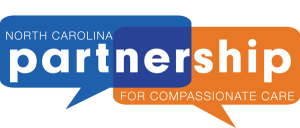 The North Carolina Partnership for Compassionate Care (NCPCC) has a new administrative home that offers the support and the infrastructure needed to carry forward the organization’s mission of ensuring patients’ choices are openly discussed, documented and honored.
The North Carolina Partnership for Compassionate Care (NCPCC) has a new administrative home that offers the support and the infrastructure needed to carry forward the organization’s mission of ensuring patients’ choices are openly discussed, documented and honored.
This news is particularly significant since Medicare will now reimburse for advanced care planning conversations with patients and Blue Cross Blue Shield of North Carolina recently announced it will begin paying for such discussions with patients as of March 15, 2016. Read BCBSNC’s policy. The NCPCC offers valuable resources to physicians and patients as they have advanced care planning conversations.
The North Carolina Medical Society Foundation (NCMSF), which has been instrumental in fostering the NCPCC’s mission, now has joined forces with the Community Partnership for Compassionate Care, which has been successful in promoting advance care planning through their Got Plans? Initiative (www.GotPlans123.org) as well as with the North Carolina Bar Association (NCBA), which has promoted advanced care planning through their A Gift To Your Family Initiative. With all initiatives housed together within the Hospice & Palliative CareCenter in Winston-Salem, the reach of each organization’s message will be extended and patients’ end-of-life care choices will be more effectively promoted.
The NCPCC website will remain the same www.compassionatecarenc.org. If you have any questions, please contact [email protected].
Major Health Care Players Pledge To Enhance Communication Through Technology
The North Carolina Medical Society (NCMS) applauds last week’s announcement by HHS Secretary Sylvia M. Burwell that the companies that provide 90 percent of electronic health records used by U.S. hospitals, the nation’s five largest private health care systems, and more than a dozen leading professional associations and stakeholder groups have pledged to implement three core commitments to improve the flow of health information to consumers and health care providers:
Consumer Access -- To help consumers easily and securely access their electronic health information, direct it to any desired location, learn how their information can be shared and used, and be assured that this information will be effectively and safely used to benefit their health and that of their community
No Information Blocking -- To help providers share individuals’ health information for care with other providers and their patients whenever permitted by law and not block electronic health information
Standards -- Implement federally recognized, national interoperability standards, policies, guidance, and practices for electronic health information and adopt best practices, including those related to privacy and security
For More Information:
Fact Sheet
List of individual organizations that have made commitments and their pledges
Federal Health IT Strategic Plan 2015-2020
Connecting Health and Care for the Nation: A Shared Nationwide Interoperability Roadmap
See the full text of the HHS press release.
Don’t Just Talk About It, Do Something
 If you have an opinion about the state of health care today, then please take The Physicians Foundation Survey of America’s Physicians. This is one of the largest physician surveys ever undertaken in the United States. The results of past surveys have helped lawmakers, influential health care policymakers and the media better understand your perspective and the challenges you face. Take a few minutes to complete this survey to add your voice to the thousands of other physicians nationally.
If you have an opinion about the state of health care today, then please take The Physicians Foundation Survey of America’s Physicians. This is one of the largest physician surveys ever undertaken in the United States. The results of past surveys have helped lawmakers, influential health care policymakers and the media better understand your perspective and the challenges you face. Take a few minutes to complete this survey to add your voice to the thousands of other physicians nationally.
The Physicians Foundation is a non-profit organization that seeks to empower physicians to lead in the delivery of high-quality, cost-efficient health care. This is the fourth national survey the Foundation has undertaken, and covers topics such as health reform, electronic medical records, new methods of physician reimbursement, ICD-10 and others. A full copy of the final survey report will be emailed to all physicians who participate.
Participants also will be entered to win one of five $500 Amazon gift cards and one $5,000 Amazon gift card. The survey is being conducted by national physician search and consulting firm, Merritt Hawkins, and will be emailed to more than 650,000 physicians across the country from March-May of 2016.
Take the survey.
To access previous Physicians Foundation surveys, visit www.physiciansfoundation.org.
